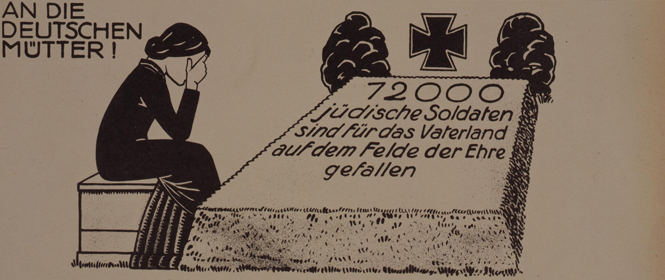
Alternative Facts, Fake News and Post-Truth Statements
The European Parliament debated it at the beginning of April, it’s what Donald Trump calls his opponents’ assertions, and in Germany, too, it has become an inescapable topic of public debate: “fake news” is a key political theme of our age. Yet, “alternative facts”, as Donald Trump’s adviser, Kellyanne Conway, called her demonstrably false statements about the numbers that attended Trump’s inauguration, are not a modern invention.
Fake news a hundred years ago: campaigns of lies against Jewish soldiers
In the permanent exhibition at the Deutsches Historisches Museum there is a rather small, almost inconspicuous leaflet, which tells of a struggle against “alternative facts”. With this leaflet, the Reichsbund jüdischer Frontsoldaten (Reich Federation of Jewish Soldiers from the Front) tried to defend itself in 1919 against the accusation that Jewish soldiers had avoided military service during the First World War. Although many Jews had volunteered as soldiers in 1914, and although some 100,000 Jewish soldiers in total fought in the German army – roughly corresponding to the percentage of Jews in the population – the rumour that Jews had shirked military service had already reared its head during the war. In 1916 the so-called “Jewish census”, instigated by the war ministry, was supposed to clear the matter up. Yet because it was a census only of Jews, not of members of any other religion, it only served to deepen anti-Semitism – especially since the findings were never published. From the letters of Jewish soldiers, we know how deeply wounded they were by this. At precisely the moment in history when they felt themselves more accepted and integrated into German society than ever before, they were once again being singled out. Lieutenant Julius Marx wrote about it in 1916: “What is this nonsense?! Do they want to demote us to second-class soldiers, make us a laughing stock in front of the whole army? […] Disgusting! This is what we get for risking our necks for our country.”
Rumours in place of facts to divert attention from wartime defeats
Today we can understand where the anti-Jewish feeling came from: despite all its efforts and sacrifices, Germany was not winning the war. The rumour was an effective distraction from military, organisational and political problems which could not be openly discussed. Associations like the Pan-German League therefore portrayed the Jews as “war profiteers” and “shirkers”, in an attempt to deflect criticism from the political decision-makers of the empire.
Even 100 years ago, then, we see a growing wave of post-factual arguments. In 1917 neither side seemed to be winning the war. For the German Empire, too, there were no victories to chalk up on any of the various fronts, but only thwarted counter-offensives such as that which took place in April at the Chemin des Dames. An end to the war, let alone victory, was nowhere in sight. The frustration at the situation, the fury over hunger and deprivation, should have led to political confrontation. In France, just as war-weary as Germany, the troops mutinied. In Germany they did not. Instead, anti-Semitic sentiment deepened.
A so-called “new beginning”: lies, rabble-rousing and anti-Semitism
After the defeat of 1918 the anti-Semitic mood increased. In 1920, the “Deutschvölkischer Schutz- und Trutzbund” (German Nationalist Protection and Defiance Federation) distributed over seven million anti-Semitic leaflets. The aim was to torpedo the new democracy. The German defeat was not interpreted as the result of wrong decisions by the imperial elite but as the fault of the young republic and the Jews. The German Jews tried to defend themselves against this rabble-rousing with information campaigns. This was the purpose of the leaflet currently on show in our exhibition, which drew attention, for example, to the 12,000 Jewish soldiers who had died for Germany in the First World War.
Even if many people knew, however, that the rumours were lies, it had no effect on the outcome. An anti-Semitic rumour does not work because it is true, but because it gives expression to an existing feeling. The truth cannot compete with such post-factual arguments. It was the German Jews who paid for this – many of them with their lives. Among them was Paul Stadthagen, one of many Jewish volunteers, an air force officer whose war decorations are kept in the Deutsches Historisches Museum. After years of exclusion and discrimination under National Socialist rule, Paul Stadthagen was deported to Theresienstadt (now Terezín) in September 1942, where he died in February 1943.